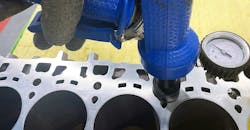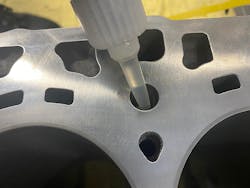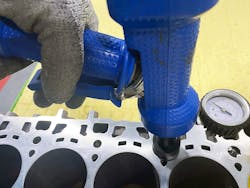‘Spot-Seal’ Impregnation Approved for Cylinder Blocks
Sealing cast parts to correct surface and solidification defects is nothing new but the process has seen significant development and expansion in the past two decades, mainly as a follow-on to increasing volumes of lightweight castings, and this mainly in transportation markets. Improving the performance or scale of sealing and impregnation processes, as well as the nature and performance of the impregnation materials, has been the driver of numerous developments.
One notable development was the ‘Selective Impregnation’ process by Impregnation Solutions Ltd., which emphasizes simplicity and low-cost, as well as performance. Selective Impregnation accurately applies an impregnation sealant only to an area of a casting with an identified leak, and uses a hand-held Spot-Seal pressure impregnation gun. (Bench-mounted and automated options also are available.) The method uses a range of rubber washers from which the most appropriate is selected and positioned onto the casting to match the precise point of porosity.
Some "porosity" problems do not present themselves on initial inspection. Final machining steps may reveal casting porosity that is not accessible for sealing prior to that step, during casting or rough machining stages — notably on cylinder blocks. This results in leak-test failures at the final stage of production and just before assembly. Several automotive engine manufacturers are now resolving this problem using the Spot-Seal localized impregnation process, according to developer Impregnation Solutions.
Additionally, at this stage of production, both the casting plugs and bearing caps are in place, and immersing a complete engine block into sealant risks residual hardened sealant contamination in the machined threads, oil ways, and water galleries, etc.
Apart from sealant contamination causing assembly problems, and possible engine failure once in operation, the additional handling of finished blocks through impregnation equipment can cause damage to the machined surfaces.
Finding leaking castings at this late stage in production represents a potentially significant loss in production time (casting, machining, assembly) as well as materials. Scrapping is very much a last resort, so an alternative method of impregnation is required.
The sealant cures rapidly within the porosity but any residual surface sealant remains liquid, so it's rinsed out easily with no risk of contamination and damage. The process is fast and recovery is typically 100%, according to the developer.
Within the larger engine manufacturing process, Spot-Seal impregnation is both manual and mobile so it can be applied to the part on the line. Then, the workpiece can be returned to production or assembly in short order. The process also can be automated for high volume applications.
Reportedly, one major automotive engine manufacturer has recovered over 2,000 engine blocks so far using the Spot-Seal process, producing an estimated $740,000 in savings in the value of the cast and machined parts. The additional savings may be greater when loss of production is taken into account without this solution.


